Blog – Posted on Friday, Feb 28
The 30 Best Dystopian Novels Everyone Should Read
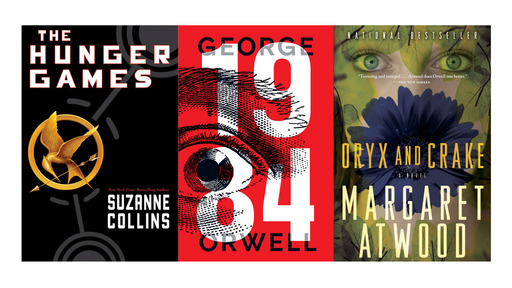
Whether they’re sci-fi books about androids dominating the world or speculative fiction tales that aren’t so far from real life, dystopian novels are never not in vogue. From widely popular series to critically acclaimed works, these stories’ social commentary caters to both casual readers and literary critics, often making the list for the best books of all time. And the enduring popularity of dystopian novels signals our perpetual and collective curiosity about where society is going.
Since the twentieth century, there has been a fairly consistent outpour of books in this genre. To help you navigate and choose between these introspective potential futures, here are 30 dystopian novels you should not miss out on.
How long do you think you can last in a post-apocalyptic landscape yourself? Take our 1-minute quiz below to find out 😉
💀
If the world ends today, how long will you survive for?
Test your survival skills in this 1-minute quiz!

1. Nineteen Eighty-Four by George Orwell
While it was published in 1949, this famous work is predictably set in 1984. Orwell’s world foresees only three continental-sized nations, at least one of which is overseen by an ubiquitous, watchful government. A censorship worker in this nation finds himself questioning the totalitarian system and its effort to obliterate individual thought and emotions, soon beginning a search for others who may be in the same boat.
On top of its other legacies, what is most astounding about this work of fiction is the meticulous worldbuilding that Orwell undertook. Based on his observations of society on the brink of the Cold War, Orwell crafted complex mechanisms such as “doublethink” and contradictory slogans like “War Is Peace” with so much care and connection to real life that it’s easy to see how this fictional autocratic world could exist. And that’s not even to mention the story itself — a chilling and unexpected journey that ensures that Nineteen Eighty-Four will stand the test of time.

2. Fahrenheit 451 by Ray Bradbury
Set in a world that many of us avid readers would find nightmarish, Ray Bradbury’s Fahrenheit 451 is the story of Guy Montag, a “fireman” who is becoming disillusioned with his job — to put it simply, he’s assigned to set fire to books, rather than put fires out. Unfortunately, society’s short attention span no longer calls for the perusal of novels, and the authoritarian state wants to prevent people from thinking too much (if at all). What the government didn’t expect is Montag opening his mind to the mysteries of the written word and beginning a quest to try and salvage these books, as well as the minds of those around him.
The Red Scare of the 1940s, which saw America gripped by an anti-communist sentiment that came close to hysteria, prompted Bradbury to write this eternal love story to books in the 1950s. But Bradbury’s warning horn against increased censorship is timeless, perhaps more important than ever in our age of Big Data, and will live on through Montag’s arduous journey.
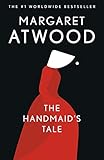
3. The Handmaid's Tale by Margaret Atwood
In this once-futuristic world — the book was published in 1985 about the near future — America is taken over by a religious sect, and the order of the country is pushed back several centuries. Horrifyingly, women are domesticized and subordinated to men, even though environmental degradation and its impact on fertility means that fertile women are inordinately more precious and desired. In the middle of all of this is Offred, a young woman who’s forced to bear children for ruling-class men.
The Handmaid's Tale’s world is markedly different from many of the other worlds that we read about in well-known dystopian novels. Its focus on women’s experience, however, is not the only extraordinary quality about this book. Atwood’s unconventional style and alternating storylines let readers unravel this complex universe at their own pace before the plot escalates to a fever pitch, cementing Atwood’s masterpiece as one of the great pillars of dystopian fiction.

4. The Road by Cormac McCarthy
In contrast to the well-crafted orders we’ve encountered thus far, The Road transports us to a universe shattered by an unnamed catastrophe. Ordinary lives are replaced by mad scrambles for food and supplies for those who survive. In this bleak “eat or be eaten” situation, a father and his young son trek southwards in anticipation of the winter, driven by their hopes to find and unite with the “good guys.”
Make no mistake: this book is truly melancholic. From bleak atmospheres to the heartbreaking loss of humanity, both physically and morally, this post-extinction setting comes to life before readers’ eyes through McCarthy’s somber prose. Rather than questioning the structures of our society, The Road encourages readers to look inward and examine our compassion in a world that’s increasingly competitive and individualistic.

5. Brave New World by Aldous Huxley
In this dystopian classic, the World State government of the year 2540 AD controls the population not by telling them what to think, but by numbing them with happiness. Henceforth Huxley’s Brave New World introduces readers to a seemingly perfect realm, with genetically-engineered, carefree, and well-fed citizens.
With mass production and Fordism in mind, Huxley’s merry consumers and blissful citizens grow up with this sort of technology and kept satisfied by it. So you can imagine how anyone who comes in from the outside “savage” world would appear to them… which is exactly what occurs, to tragic effect. The most striking and thus memorable thing about this novel is how it shows that the state doesn’t need to ban books or torture dissenters to silence them — our culture can purge itself of intellectuality simply through self-indulgence.

6. Blindness by José Saramago
Set in the 1990s, this Nobel Prize winner describes a city's social order that disintegrates as a curious contagion infects its population. As cases spiral out of control, food runs scarce, and criminals exploit the chaos, the militant state heightens surveillance and set up quarantines to try and maintain order.
At the heart of Blindness is our refusal to see the violence and heartlessness that already exist in our society. Saramago is a famous allegorist, and he’s at his best in this work: with his unique style and resounding imagery, he emphasizes this harsh reality, and makes note of the importance of solidarity and compassion in dire situations.

7. A Clockwork Orange by Anthony Burgess
In this disturbing world, youth alienation manifests in a much more dramatic manner than heavy metal rock laden with angst. Indeed, our protagonist, Alex, bonds with his rebellious friends by means of vandalism and atrocious crimes. As his parents and social institutions attempt to stop and help him, Alex begins to adopt a different view of his friends and the isolating culture that he has grown up in.
Full of violence, psychological manipulation, and a secret language made up of Shakespearian and Russian loanwords, A Clockwork Orange is not the easiest read. Burgess’s system of elaborate slang may have been genius, but his hauntingly powerful descriptions of brutality aren’t exactly pleasant, and made the book rather controversial. Nonetheless, the exploration of youth’s dissatisfaction with what society expected from them, evident at the time of the book’s publication, is still magnificent and incredibly timely.

8. The Children of Men by P.D. James
Set in 2021, James’s 1992 novel speaks of another society broken by infertility. As the last people to be born on Earth get killed in a pub fight and the world falls into disorder with no future for humanity, historian Theo Faron finds himself caught in a political fight with his dictatorial cousin, Xan. But then the struggles take a new turn when Theo finds out that there may be some hope for a future after all.
The Children of Men provides a different vision of the end of humankind — one that’s not caused by a holocaust or an ice age, but rather by something much more gradual and believable. While our 2020 (fortunately!) doesn’t seem to be leading us to the death of our species, the suspenseful journey of Theo Faron may shock you with how close we are to the problem of depopulation.

9. Do Androids Dream of Electric Sheep? by Philip K. Dick
Philip K. Dick’s acclaimed novel transports its readers to a post-apocalyptic world in which conditions on Earth have been made unlivable by natural disasters. As a result, we see the rise of artificial creatures that resemble organic creatures, which include humanoids. A bounty hunter receives an order to kill six of these androids, who he now must identify among the actual humans.
Action-packed and full of intriguing worldbuilding — from bizarre psychological tests to see if a human is indeed an android to social status determined by the collection of naturally bred animals — this novel will leave readers reeling. Do Androids Dream of Electric Sheep? proves to be a loaded question, prodding us to think about what makes us human and what AI technology has in store for humanity.

10. The Drowned World by J.G. Ballard
In the year 2145, the world sweats as global warming takes over, flooding cities and mutating animals into beasts. As civilization becomes ravaged by these prehistoric creatures, Dr Robert Kerans and his team venture into newly uncharted territory to research the now-wild world.
Published in 1962, The Drowned World is one of the earliest works of “cli-fi” (climate fiction) written. This adventurous novel takes us on a journey into the new unknown, where territories that we once built are morphed into sweltering tropical labyrinths. Yet it’s more than a mere adventure: Ballard’s plot is ultimately a clever Trojan Horse to discover the implications of this grisly possibility and the psychological effects that it has on humans.

11. We by Yevgeny Zamyatin
In a glimmering glass city of the distant future, humans live like androids — emotionless, passionless, and nameless. Each human is identified by number and only one of them, mathematician D-503, seems to realize that he can do things and think about things differently. As he discovers his own feelings through his relationships with others, readers learn more about the odd conventions of this totalitarian system — and the consequences of defying it.
If the plot of this book sounds familiar to you, that’s because it was the inspiration for many subsequent acclaimed dystopian novels, such as Nineteen Eighty-four and Brave New World. Published in 1921, it was an absolute trailblazer for this genre. Beyond its originality, We also shines in its prose — its purposefully abrupt sentences and dry language emphasizes both the squarish quality of the mathematician narrator and the colorlessness of the world he lives in.

12. Never Let Me Go by Kazuo Ishiguro
At the beginning of Never Let Me Go, we meet a caretaker in her thirties who reminisces about her school days as she runs into her old classmates. While this sounds like it could be just another young adult book mistakenly added to a list of dystopian novels, don’t be fooled: as we sink deeper into Kathy H.’s memories, elements of an unconventional and alarming society will emerge.
Guiding through the entire maze is Ishiguro’s simple but emotive writing, which captures the eternal question of morality in an age of rapidly developing medical technology. And Never Let Me Go’s setting in the 1980s, rather than the distant future, gives the story an eerie sense of reality — easily driving Ishiguro’s commentary home.

13. Station Eleven by Emily St. John Mandel
Station Eleven hops back and forth between the timelines of several key characters: a dead actor, his first wife, the paparazzi who tried to save him, his close friend, and a young aspiring actress who witnessed his death. As if that’s not enough, their lives were also disrupted by a deadly flu that’s wiped most of civilization out of existence.
In this popular recent novel, Emily St. John Mandel explores the meaning of humanity by stripping away all the conditions that made it what it is. Rather than surprising you with fantastical mutations, Station Eleven leaves a deep impression on you by showing you what extreme conditions can do to human beings. Indeed, the depth of imagination and care in Mandel’s worldbuilding — what people remember, what survives of the old world, and what must be drastically adapted — gives this dystopian novel the uncanny cadence of a nonfiction account, as if she’s observed it all firsthand.

14. The Time Machine by H. G. Wells
This classic (which you can now listen to!) tells the story of a Victorian scientist who tests his time machine and travels to the far-off future, where he finds a carefree world occupied by childlike people. The scientist spends some time uncovering the development of humankind before returning to where he parked his Time Traveller — only to realize it is gone. As his adventure continues, the grim underbelly of this seemingly indulgent future comes to light.
As one of the first sci-fi works ever written, The Time Machine will take you on a wild ride without a particularly convoluted plot line (just a very well-executed twist). In a nutshell, this brilliantly simple story allows the hallmark commentary of late Victorian literature on duality and societies’ dark undersides to shine through.

15. Oryx and Crake by Margaret Atwood
Oryx and Crake tracks two friends, Jimmy and Crake, who happen to stumble upon the dark side of the Internet in their teenage years: a simple act fuelled by youthful curiosity that would change their lives forever. In their adult years, the world’s population takes a nosedive after an odd pandemic strikes, and survivors desire to create genetically “better” humans. At the center of these technological developments is Crake, now a grown scientist, and Jimmy.
Very different from Atwood’s popular totalitarian novel, The Handmaid’s Tale, this first installation of The MaddAddam Trilogy is as much a tale of the rippling effects of childhood experiences as it is a warning against gene modification. Atwood’s striking writing fleshes out these dynamics with such depth that it will leave you both awed and disturbed by how plausible these frightful developments seem to be.

16. The Hunger Games by Suzanne Collins
Returning to the theme of life under totalitarian states, we have Katniss Everdeen’s rise to stardom in a horrific reality TV show called The Hunger Games. If you’re not already familiar, this involves two people from each District of the country being randomly picked out, brought together, and forced to kill each other in what is essentially a massive and deadly obstacle course — only one can emerge victorious, all for the sake of the upper class’s entertainment.
This gripping survival story, also one in a series of three, became a pop culture phenomenon almost immediately after its publication in 2008. Beyond portraying a twisted, hierarchical society, The Hunger Games is about finding a way to rise above difficulties and the absurd ignorance that people may have for others’ suffering.

17. Parable of the Sower by Octavia E. Butler
In Parable of the Sower’s grim and disorderly vision of the future, climate catastrophe leads to scarce resources and global anarchy, sparing only a few gated neighborhoods such as the one in which Lauren Olamina lives. Yet even the safety of her community will come under threat, as Lauren and her family try to prop up whatever’s left of civilization’s moral order.
Parable of the Sower obliterates all traces of a functioning society, leaving behind profound sorrow, but still honing in on the hope that one can still experience in such a situation. Even though it is told through Lauren’s youthful voice, the emotional depth explored makes the story hauntingly mature.

18. The Chrysalids by John Wyndham
Plunging the world into a technological dark age after the collapse of civilization, The Chrysalids shows us what remains after the storm — a small community driven by the belief that only by maintaining strict normalcy can they avoid God’s punishment (unlike their predecessors). Subsequently, they become eugenicists, killing or sending “mutant” humans into the unknown. At the heart of this community is David, son to a devout man and authority figure, and his own secret mutation.
Though dissimilar to Wyndham’s other sci-fi creations, this is often considered his best book. Fast-paced, suspenseful, and insightful in its reflection of social exclusion and discrimination, The Chrysalids is as entertaining as it is thought-provoking.

19. The Giver by Lois Lowry
You likely know this one already. In case you’re not familiar, let’s do a quick recap: The Giver is the story of a teenage boy, Jonas, who grew up in a utopia where everyone is content with their routines and colorless world — including Jonas. But all of this changes when he is chosen to be the Receiver of Memory, a role where he is to know all that others have forgotten. So begins a journey in which Jonas discovers hard truths about his world and must somehow come to terms with them.
Though this beloved coming-of-age story is a shorter read when compared to other sci-fi and dystopian novels, it packs a powerful message. Lowry vividly takes the readers through the innocent internal dilemmas of a growing boy, highlighting the struggle to choose between individual freedom and security.
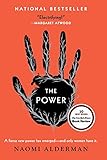
20. The Power by Naomi Alderman
Five thousand years into the future, the world is dominated by women, and a male author pens a work of historical fiction detailing how this matriarchy came to be — creating a meta book-within-a-book that allows Alderman to slyly comment on men’s perception of this change. The origin story itself, which is sparked by women’s sudden possession of electrical superpowers, is set in the 21st century, intertwining the stories of many different women from different parts of the world who cultivate this power to turn the tables against those who have been stifling them.
If you go into this book expecting a gender equality utopia, you will be disappointed. At its heart, The Power is as much a book about systematic inequality as it is about women’s plight. The narrative’s unique concept explores the complexity and difficulty that the characters with superpowers have, and ultimately issues a warning against going too far on our quest to redress an imbalance.

21. The Stand by Stephen King
From the pen of master story-teller Stephen King comes this horrific tale of good and evil, of humanity and chaos in a broken world. This enduring fantasy novel is the account of the 1% — specifically, their odysseys after the accidental unleashing of a lethal biological weapon.As mayhem rages across the world, survivors have to build a new order for themselves while avoiding infection. But two distinct groups, with different supernatural abilities, come to two drastically different conclusions about how society should go on, eventually confronting each other as their stories converge.
King’s skillful narration takes readers of The Stand on a roller coaster ride as they explore the pains of the characters’ losses, as well as their hopes for a better tomorrow.

22. The Dispossessed by Ursula K. Le Guin
Ursula K. Le Guin’s powerful book tells the story of physicist Shevek on two wildly different (but parallel!) planets: he hails from the anarchic planet called Anarres, but ends up on the capitalist world of Uras. The two stories set in these different places and times are told alternately as we discover the strange features of their polar-opposite worlds.
Though The Dispossessed is part of a series of seven books, it can definitely be enjoyed on its own. Interestingly, it is actually a utopian novel which explores and contrasts the freedoms of an anarchic society to the constraints of a capitalist one. Nonetheless, Le Guin’s utopia has been described as “ambiguous,” suggesting that there’s more than what’s on the surface — you’ll have to judge for yourself.

23. Battle Royale by Koushun Takami
This Japanese thriller novel is about a group of teenagers who are forced onto an island with nothing but weapons, and are expected to kill each other until only one survives — all as a part of a military training program. As chaos ensues, Shuya Nanahara decides to protect his friends rather than abide by this gruesome playbook… but the dark side of a fascist Japan becomes clearer with every passing day that this teenager defies the militant state.
Though Battle Royale’s grisly plot line kept it from being published right away, it enjoyed great success once it was printed, and continues to be a cult favorite to this day. (And if the plot sounds similar to The Hunger Games, that’s because Suzanne Collins was inspired by Takami’s ingenious story — all the more reason for you to pick it up!)

24. Borne by Jeff VanderMeer
In this bizarrely intriguing version of the future, an unknown city is ruled by a ginormous bear. If that’s not strange enough for you, get this: there’s an eccentric organism called Borne tangled in the grizzly’s fur. That fact only comes to light through Rachel, a girl who makes a living out of scavenging for products made by a biotech firm called the Company — which is how she stumbled upon Borne in the first place.
The resulting topsy-turvy literary sci-fi novel, Borne, brings the ecologically ravaged world to readers in the most unconventional way. It may take a while to get into Vandemeer’s writing, but the story that awaits is well worth your time.

25. The Iron Heel by Jack London
The Iron Heel’s realm is one in which the long-drawn socialist revolution had succeeded, and totalitarian states reign across the globe. In the US, the Oligarchy runs the show in the name of equality, although the reality of its governance proves to be very different. In a metafictional touch, the readers learn of the origins and problems of this world through the discovery of an autobiography manuscript written in the 1930s.
First printed in 1908, this book impresses not only because it was among the first dystopian fiction ever published, but also because of its uncanny predictive power. While there is no Oligarchy running the White House now, hats off to Jack London and his interpretation of political developments, which were actually not far off from what the world ended up going through in the 20th century.
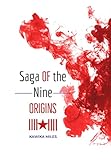
26. Saga of the Nine: Origins by Kawika Miles
In this new American dystopian, we follow both Jax, a lowly mill worker in an unnamed tyrannical future, and Mica Rouge, a veteran watching his country being torn apart in a not-too-distant time. In a war across time, both men are pulled into a fight against the Nine, the Ordean Reich, and their dystopian designs for not only the United States, but the world.
In this debut novel by American author Kawika Miles, readers will find themselves in a refreshing take on the dystopian genre. While the world Miles creates is rampant with your typical themes of censorship, corruption, rebellion, and tyranny, characters are rife with internal conflict due to the violence, betrayal, and dishonor within factions and amongst apparent comrades.
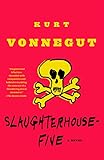
27. Slaughterhouse-Five by Kurt Vonnegut
Following unreliable narrator Billy Pilgrim, who flits back and forth between the memory of his service during World War II and his years after repatriating to America, Slaughterhouse-Five is clearly the story of a man driven to the brink by violence. Billy’s life becomes even more unbelievable when he gets abducted by an outer-space race whose conception of time and death eerily reflects the inhumane sentiments he encountered during the war.
Though its plot might be a little mind-bending, Slaughterhouse-Five discusses the same questions of morality and materialism at its core. What really stands out is Vonnegut’s decision to let his character look back in time, which reminds us that dealing with the past is as big a part of progressing as searching for the future.

28. Lord of the Flies by William Golding
Many are probably familiar with this classic from their middle school years: they make us learn it for a reason! But let’s run through it: a wartime evacuation flight crash-lands on a deserted island, leaving only a gang of preadolescent boys as its survivors. This band of ragtag boys are forced to organize themselves in order to survive. Meanwhile, their mini-society exposes the true horror at the heart of humanity. Lord of the Flies compresses the trials of growing up into a single event, thus accentuating the devastating consequences of a world that is selfish and without orders.

29. Ready Player One by Ernest Cline
In Ernest Cline’s Ready Player One, teenager Wade Watts joins an Easter egg hunt in the virtual world of his gaming community, hoping to reap its hefty rewards: the inheritance of both the company that produced the game and the fortunes of its creator. But what were once just virtual fights become very real as players battle each other for this unbelievable prize.
Reader Player One intrigues on several counts — firstly, in the portrayal of the increasingly unequal world in which Wade lives; and secondly, in the book’s advanced technology, which is actually not far from our own. Cline’s work duly reminds us of how blurred the line between reality and virtuality is becoming, and how that may also be seen as a way to blur crucial social divides.

30. The Wall by John Lanchester
The Change has flooded the world — leaving Joseph Kavanagh’s island nation to build a wall to protect itself from the tide and asylum seekers who deemed “the Others.” Joseph’s job as a Defender is to keep these people out, although there are moments where he comes to question this task.
Rightly called the “dystopian fable for our time” for its handling of immigration and xenophobia, this novel touches on all of the most urgent issues currently flooding our media. Most noteworthy is The Wall’s ability to show what may be waiting for us several decades down the line, forcing us to take stock of the vulnerability of humans in the face of nature.
***
If suspenseful novels are your cup of tea, check out this list of the best ones here! Or if you’d like some food for thought but are short on time, have a quick look at these super short stories.



